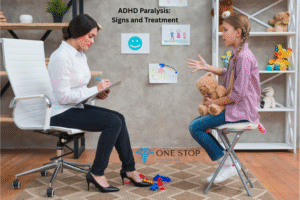What is Anxiety?
Anxiety is a mental health disorder characterized by feelings of worry, anxiety, or fear that are strong enough to interfere with one’s daily activities. There are different types of anxiety disorder. Causes include stress, trauma, genetics, and others. Symptoms of anxiety may include feeling irritable, restless or jittery, having muscle tension, or having trouble sleeping. The most common treatment options for anxiety disorders are therapy and medication.
Types of Anxiety
There are different types of anxiety, and each type can have different symptoms. Treatment options will vary depending on the type of anxiety you have. Here are some of the most common types of anxiety:
Generalized Anxiety Disorder (GAD): People with GAD worry excessively about everyday things like work, school, or health. They may have trouble sleeping and feel tense all the time.
Panic Disorder: People with panic disorder experience sudden and intense episodes of fear. These episodes can include physical symptoms like a racing heart, sweating, and shortness of breath.
Social Anxiety Disorder: People with social anxiety disorder feel extremely anxious in social situations. They may worry about being embarrassed or judged by others.
Specific Phobias: A specific phobia is an irrational fear of a specific object or situation. Common phobias include heights, flying, spiders, and needles.
Symptoms of Anxiety
Anxiety is a normal emotion that we all feel from time to time. It can be triggered by a stressful event, like a job interview or public speaking engagement. But for some people, anxiety can become a chronic condition that interferes with their daily lives.
There are many different symptoms of anxiety, and they can vary in intensity from person to person. Some common symptoms include:
-Feeling restless or on edge
-Having trouble concentrating or feeling like your mind is “racing”
-Experiencing physical symptoms like sweating, heart palpitations, or stomach upset
-Avoiding situations or activities that make you anxious
If you’re experiencing any of these symptoms on a regular basis, it’s important to talk to your doctor. They can help you determine if your anxiety is caused by a medical condition, and they can provide treatment options to help you manage your symptoms.
What Causes Anxiety?
Anxiety is a feeling of uneasiness, worry or fear. Everyone feels anxious at some point in their lives. However, some people feel anxious more often than others and it can start to interfere with their everyday life. So what causes anxiety?
There are many different things that can cause anxiety, including stress, genetics, medical conditions and certain medications. For some people, it may be a combination of several factors.
If you’re feeling anxious more often than usual, it’s important to talk to your doctor to rule out any underlying medical conditions. They can also help you find the best treatment options to manage your anxiety.
Signs and Symptoms
Anxiety can manifest itself in many different ways. Some people may experience physical symptoms such as a pounding heart, sweating, or trembling. Others may feel like they are in a state of constant worry or fear, and may have difficulty sleeping or concentrating. Still others may have panic attacks, which are periods of intense fear or distress that can come on suddenly and without warning.
While everyone experiences anxiety from time to time, it becomes a problem when it starts to interfere with your day-to-day life. If you find yourself feeling anxious more often than not, it might be time to seek out treatment. There are many different options available, and a qualified mental health professional can help you find the one that’s right for you.
Treatment Options
There are many different ways to treat anxiety, and what works for one person may not work for another. It’s important to work with a mental health professional to figure out the best plan for you. Here are some of the most common treatment options:
Cognitive behavioral therapy: This type of therapy helps you identify and change negative thinking patterns that contribute to your anxiety.
Exposure therapy: This therapy involves gradually exposing yourself to the things that make you anxious. The goal is to help you learn to manage your anxiety in a healthy way.
Medication: There are several different types of medication that can be used to treat anxiety. Antidepressants, anti-anxiety medications, and beta-blockers are all common options.
Relaxation techniques: Relaxation techniques such as yoga, meditation, and deep breathing can help reduce stress and promote calm.
Lifestyle changes: Making changes to your diet, exercise routine, and sleep habits can also help reduce anxiety.
Conclusion
If you’re struggling with anxiety, know that you’re not alone. Millions of people around the world suffer from this condition. But there is hope! With the right treatment, you can manage your anxiety and live a happy, healthy life.
If you think you might have anxiety, dont hesitate just contact us. They can help you diagnose the condition and develop a treatment plan that’s right for you. Don’t suffer in silence – get help today!
Call us for free consultation: Ph: (754) 270-6322
Address: 8910 Miramar Pkwy Office 309G, Miramar, FL 33025




